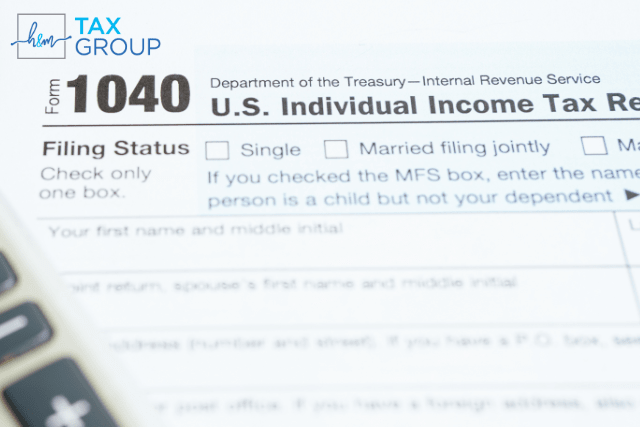Tax season can be stressful, especially when you have a short time, missing document forms, or unexpected issues. Thankfully, both individuals and corporations can apply for a file tax extension with the IRS, which gives you extra time to carefully prepare your return and stay out of trouble.
At HM Tax Group, we have the best tax consultants in Dallas, whether you need services for yourself or your business. In this blog, you will learn about the process of tax filing, including “What it is and how to apply for it” and “Why you need a tax advisor for tax filing in Dallas?”
Step-by-Step Method of Filing a Tax Extension
There are a few steps required to file a tax extension successfully with the IRS.
1. Estimate the Liability of Your Tax
You must calculate your whole tax obligation and contrast it with the amount you have previously paid in quarterly installments or withholding before requesting an extension. By the initial due date, the IRS anticipates that you will have paid at least 90% of your tax burden.
If you’re not sure how to compute your estimate, it’s smart to visit a tax filing consultant in Dallas who can aid you with estimates and guarantee you’re avoiding excessive penalties.
2. Complete Form 4868 of the IRS
Fill out the Form 4868 application for Automatic Extension for Individual Income Tax Return to get a federal tax extension.
This form can be submitted in three different ways:
- It can be e-filed by using software or by hiring a professional. This gives you prompt confirmation that your request has been received by the IRS.
- Obtain the form from the IRS website, manually complete it, and mail it to the IRS address designated for your state.
- You do not need to fill out this form individually if you designate a payment as an extension and make the payment by using other options, like a credit card processor, IRS Direct Pay, etc. The IRS considers the payment to be an extension request.
3. Pay the Estimated Taxes
You are still required to pay taxes even if you request an extension. To avoid a fine, any expected payments must be made before the first tax deadline. Those who have several sources of income or complex finances can work with a tax professional in Dallas to be sure their estimates are correct and they are not overpaying or underpaying.
4. Confirm Acceptance and Maintain Documents
If you file your extension electronically, the IRS will let you know that it was accepted. This acknowledgement ought to be preserved. If you mailed your form, consider utilizing official mail or a delivery verification service.
Why is it important To File?
Anything can happen in life at any time. Even the most well-organized people and companies occasionally find themselves unprepared to submit their tax file. The major reasons for filing a tax extension are:
- Delayed or missing tax returns, such as K-1s, 1099s, or W-2s.
- The major incidents in life, like getting sick, moving, or losing a pet.
- Complex tax scenarios, such as those involving investments, several sources of income, or deductions for commercial purposes.
- Schedules that are too full, particularly for independent contractors or anyone juggling several commitments.
- Awaiting expert help is possible that your certified tax consultant is overbooked. And need more time to properly file on your behalf.
- Filing an extension, for whatever reason, can help you avoid expensive errors.
What Do You Know About Tax Extensions?
It is a formal request that you make to the IRS to extend the time frame for submitting your tax return. This extension typically gives you an additional six months to file your taxes, if it is approved.
It is important to remember that this extension only applies to filing your return and does not affect any outstanding taxes. You still have until the initial filing deadline.
Advantages of Submitting a Future Tax Extension Application
Requesting an extension does not have to be a last-minute decision; it can be a strategic one. The following are the main benefits:
- Reduce stress level and anxiety throughout tax season.
- Gives more time to collect documents and arrange deductions.
- Allows self-employed and small business owners more time to handle intricate revenue and spending management.
- Decrease the chance that errors may lead to audits or modifications.
- Keeps late filing penalties from being applied. It can reach 25% of the monthly amount of taxes that are not paid.
What About State Taxes?
The IRS extension is automatically accepted in many states, but in others, an application or anticipated payment is needed. Dallas residents often do not need to file a state-level tax extension because Texas does not impose a state income tax.
Nonetheless, it is advisable to get professional advice if you run a business or are liable for other state-level taxes. You can find out if you have any additional state needs by speaking with a Dallas-based tax specialist.
What Are the Common Mistakes to Avoid?
The process of submitting an extension is quite simple; however, there are a few things to be aware of:
- Don’t miss the deadline for extension requests.
- The extension doesn’t delay your payment, unlike what you might think.
- Not calculating and paying your taxes.
- Not sure if your request for an extension was accepted.
- Disregarding additional tax requirements, including quarterly payments or company filings.
- Many complications can be avoided by collaborating with a tax expert who understands your situation. And then guide you through the procedure.
When Should You Need a Tax Advisor?
Professional assistance should be considered if you have any of the following:
- Self-employment income
- Capital gains, real estate deals, or investments
- Several sources of income or jobs
- Complicated retirement distributions or deductions
- Ownership of a business or a 1099 contract job
- Previous tax audits or IRS problems
In this situation, you can hire a professional tax advisor for yourself. At HM Tax Group, we can guarantee that your extension is correctly filed and that your taxes are computed. It also saves you from unpleasant surprises later on.
Conclusion
When you’re struggling with complications or delays, filing for a tax extension might be a wise and stress-relieving tactic. Just keep in mind that an extension extends your filing period, not your payment deadline. Working with a professional will provide you with the assurance that your return is on schedule. And your expected payments are on track, and your extension is handled correctly.


